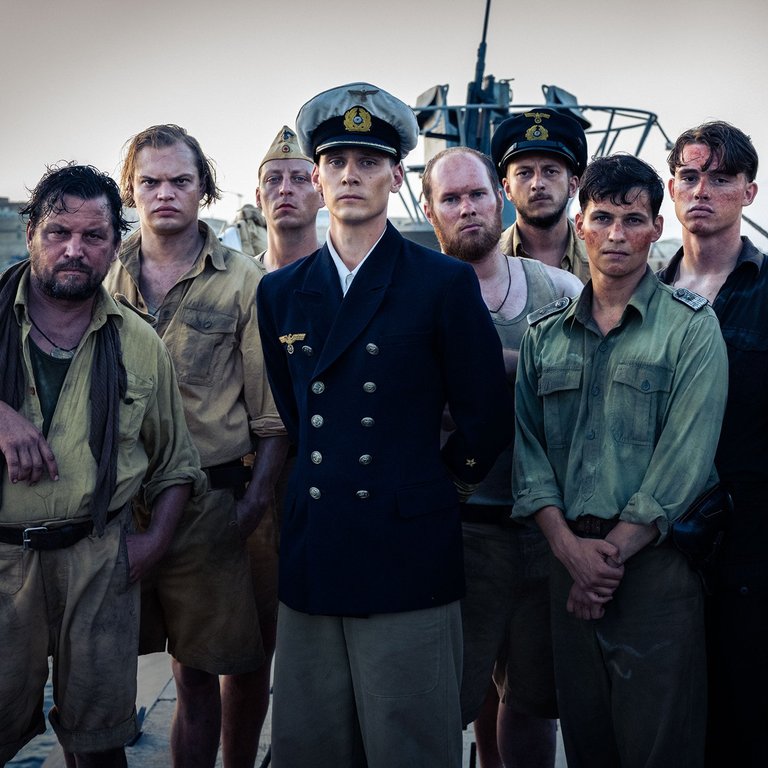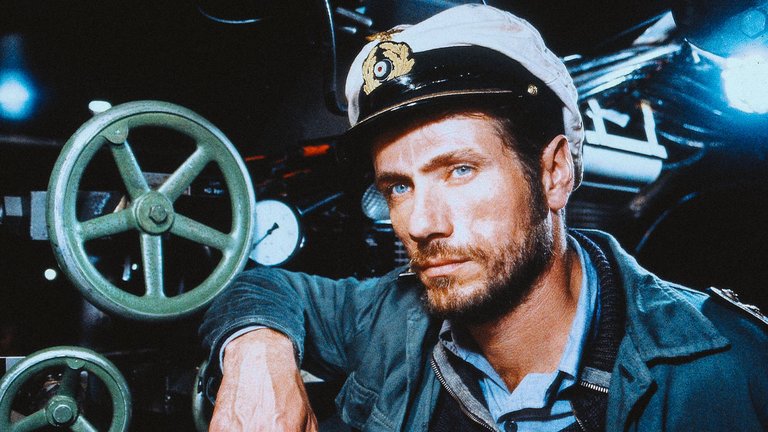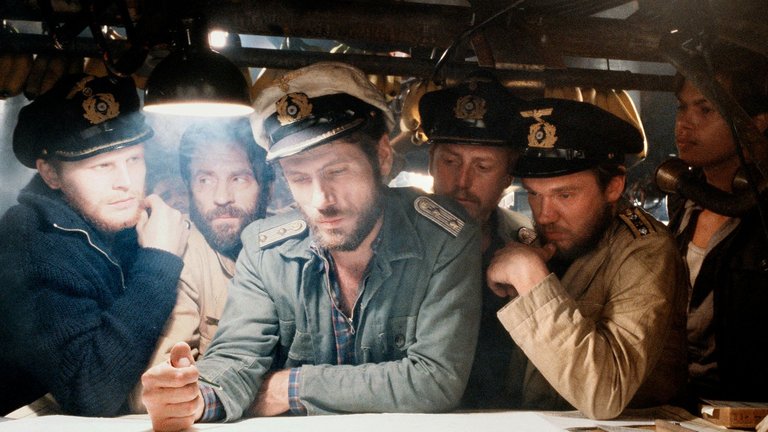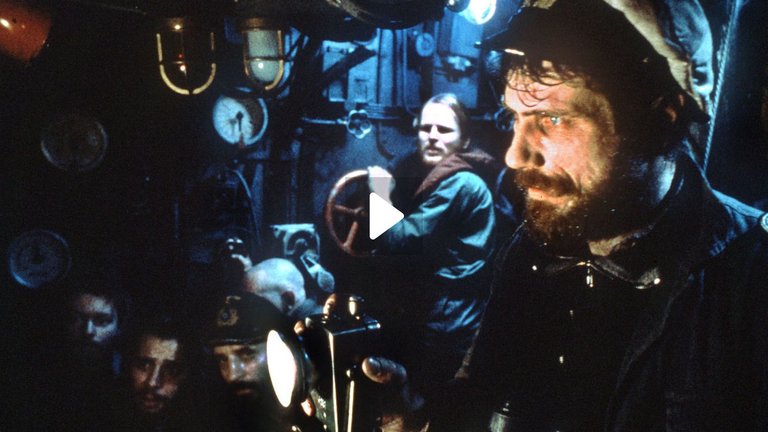Das Boot (1981) Review
The sea has always been associated with freedom, a vast ocean that has inspired many. As the saying goes, the sea is the last refuge of freedom but also its most ruthless executioner.
Imagine a place where air is a luxury, where every sound can be a death sentence, and where camaraderie is the only light in suffocating darkness. Now, transport that image to the heart of a German submarine during World War II, where ordinary men (many of them young) face not only their enemies but also their own mortality and despair. Each of them is fighting to save their lives—from their foes and from themselves.
In "Das Boot," a visual and auditory poem unfolds, transforming claustrophobia into art and fear into pure narrative. This is the story of warriors who do not fight for glory but for survival—men who discover, beneath tons of water, that the true battle is never external but internal. Indeed, under the crushing weight of those tons of water, the heaviest and most dangerous burden for survival is one's own thoughts. "Das Boot" is not a movie about heroes versus villains, as one might expect from a war film. Instead, it represents the brutal battle soldiers endure, where the ocean becomes both judge and executioner.
What sets "Das Boot" apart from other war films, elevating it to masterpiece status, is its human focus. Rather than glorifying war or celebrating a victorious hero, the movie delves into the dehumanizing effects of conflict. The crew are neither heroes nor villains but ordinary men caught in extraordinary circumstances. In fact, there is a sequence where a commander grows frustrated with the young crew, calling them "children," likely unaware of the horrors they are about to face. This raw, realistic perspective, combined with flawless direction, makes the film a gem that has stood the test of time.
"Das Boot" follows young war correspondent Werner, who joins the crew of the German submarine U-96 to document their mission in the Atlantic. Under the command of the Captain (masterfully played by Jürgen Prochnow), the submarine faces numerous challenges, from Allied destroyer attacks to dwindling resources and emotional tension that threatens to unravel the men.
The submarine's claustrophobic setting and constant uncertainty create a suffocating atmosphere for both the characters and the audience. As the mission grows increasingly perilous, the men confront their fears, fight to survive, and question the legitimacy of war. The story’s culmination serves as a brutal reminder of the human tragedies inherent in any conflict. Personally, I have never suffered from claustrophobia, but through an exercise in empathy, witnessing the submarine’s conditions and the men inside made it impossible not to feel suffocated.
Director Wolfgang Petersen delivers a masterful portrayal of the intensity of life within a submarine. His ability to balance action, drama, and psychological tension is extraordinary. Filming in enclosed, tight sets heightens the sense of isolation, trapping the audience along with the characters.
The cinematography is a treasure; inside the submarine, the shots are oppressive and detailed, conveying extreme confinement. The few ocean scenes are equally striking, particularly those depicting waves crashing against the submarine's hull. The handheld camera and fluid movements enhance the vertigo one might feel at sea.
The sound design in "Das Boot" is one of its greatest achievements. The constant hum of engines, the echo of sonar, and the creaking of the pressured hull create a palpable tension. The film’s score perfectly complements this, evoking melancholy and a sense of complete abandonment.
The cast, led by Jürgen Prochnow as the Captain, delivers phenomenal performances. Prochnow masterfully balances authority and humanity in his character, while Herbert Grönemeyer, as correspondent Werner, serves as the audience’s lens, showing how war affects even the most impartial observers. Every crew member adds depth and authenticity to the story.
When I first watched "Das Boot," I felt like I was experiencing the journey alongside the crew. The claustrophobia and constant danger were so tangible that I found myself holding my breath during several scenes, as if I were in the submarine, particularly during the attacks by Allied destroyers.
What impressed me most was the humanity of the characters. They weren’t caricatures of German soldiers or war machines; they were ordinary men, each grappling with fear, frustration, and despair in a war they didn’t choose. The Captain, portrayed by Jürgen Prochnow, is an unforgettable character—his leadership and vulnerability make him the heart of the film.
That said, I must admit the film’s length was a challenge. Clocking in at over three hours (every second essential), the slow pace reflects the monotony and tension of submarine life, but at times, I wished the narrative moved faster.
Ultimately, "Das Boot" is not just a war movie—it’s an experience. It’s a masterpiece that blends suspense, drama, and profound reflection on the nature of war and its impact on those who endure it. For me, it’s an essential film, though not suited for those seeking non-stop action or superficial entertainment.
Das Boot (1981)
El mar ha estado asociado a la libertad, el vasto océano siempre ha sido objeto de inspiración para muchos, dice la frase que el mar es el último refugio de la libertad, pero también su más despiadado verdugo.
Imaginen un lugar donde el aire es un lujo, donde cada ruido puede ser una sentencia de muerte y donde el compañerismo es la única luz en una oscuridad asfixiante. Ahora, trasladen esa imagen al corazón de un submarino alemán durante la Segunda Guerra Mundial, donde hombres comunes (muchos de ellos jóvenes) enfrentan no solo a sus enemigos, sino también a su propia mortalidad y desesperación. Todos ellos tienen buscan salvar sus vidas, de sus enemigos y de ellos mismos.
En "Das Boot" se construye un poema visual y auditivo que transforma la claustrofobia en arte y el miedo en narrativa pura. Esta es la historia de guerreros que no luchan por gloria, sino por sobrevivir; hombres que descubren, bajo toneladas de agua, que la verdadera batalla nunca está fuera, sino dentro de ellos mismos, nunca mejor dicho, pues bajo el peso de esas toneladas de agua, lo más pesado y peligroso para le sobrevivencia es tu propios pensamientos. "Das Boot" no es una película de héroes contra villanos como podría ser una película acerca de la guerra, si no más bien representa esa batalla cruenta que viven los soldados, en este caso donde el juez y verdugo es el océano.
Lo que diferencia a Das Boot de otras películas bélicas y lo que la hace una obra maestra es su enfoque humano. En lugar de glorificar la guerra, y ensalzar a un héroe vencedor sobre sus rivales, la película muestra los efectos deshumanizantes de la guerra. La tripulación no son héroes ni villanos como dije anteriormente son hombres comunes atrapados en circunstancias extraordinarias, de hecho hay una secuencia en la película donde un comandante se molesta de los jóvenes que es su tripulación, los llama "niños", y seguramente no tienen idea a lo que están por enfrentarse. Esta perspectiva cruda y realista, combinada con una dirección impecable, hace que este film sea una joya que haya perdurado por los años.
"Das Boot" sigue al joven corresponsal de guerra Werner, quien se une a la tripulación del submarino alemán U-96 para documentar su misión en el Atlántico. Bajo el mando del Capitán (interpretado magistralmente por Jürgen Prochnow), el submarino enfrenta numerosos desafíos, desde el asedio de destructores aliados hasta la escasez de recursos y la tensión emocional que amenaza con desmoronar a los hombres.
El ambiente claustrofóbico del submarino y la incertidumbre constante crean un sentimiento de asfixia tanto para los personajes como para el espectador. A medida que la misión se torna más peligrosa, los hombres enfrentan sus miedos, luchan por sobrevivir y cuestionan la legitimidad de la guerra. La culminación de la historia es un recordatorio brutal de las tragedias humanas que acompañan a cualquier conflicto. La verdad es que yo nunca he padeciendo de claustrofobia, ni nada parecido, pero en un ejercicio de empatía, al ver la situación del submarino y los hombres ahí dentro me fue imposible no sentirme asfixiado.
El director de esta película (Wolfgang Petersen) realiza un trabajo magistral al capturar la intensidad de la vida dentro de un submarino. Su capacidad para equilibrar la acción, el drama y la tensión psicológica es maravillosa. La elección de filmar en sets cerrados y estrechos aumenta la sensación de aislamiento y el espectador se siente encerrado todo el tiempo.
Los planos son una joya, dentro del submarino son opresivos y detallados, transmitiendo la sensación de confinamiento extremo. Las escenas en el océano, aunque limitadas, son igualmente impactantes, especialmente aquellas que muestran las olas azotando el casco del submarino. La cámara en mano y los movimientos fluidos ayudan a dar esa sensación de vértigo que podría sentir una persona en el mar.
El diseño sonoro de Das Boot es uno de sus mayores logros. El constante zumbido de los motores, los ecos del sonar y los crujidos del casco bajo presión crean una atmósfera de tensión palpable. La banda sonora de este este film hace su trabajo a la perfección, transmite esa melancolía y esa sensación de abandono total.
El elenco, liderado por Jürgen Prochnow como el Capitán, ofrece actuaciones fenomenales. Prochnow equilibra perfectamente la autoridad y la humanidad de su personaje, mientras que Herbert Grönemeyer, como el corresponsal Werner, sirve como el ojo del espectador, mostrando cómo la guerra afecta incluso a los observadores más imparciales. Cada miembro de la tripulación aporta profundidad y autenticidad a la historia.
Cuando vi Das Boot por primera vez, sentí que estaba viviendo la experiencia junto a la tripulación. La claustrofobia y el constante peligro eran tan palpables que me encontré aguantando la respiración en varias ocasiones como si tal yo estuviera en el submarino, especialmente durante las escenas en las que el submarino es atacado por los destructores aliados.
Lo que más me impresionó fue la humanidad de los personajes. No eran caricaturas de soldados alemanes ni máquinas de guerra; eran hombres comunes, cada uno lidiando con el miedo, la frustración y la desesperanza de una guerra que no eligieron. El Capitán, interpretado por Jürgen Prochnow, es un personaje inolvidable: su liderazgo y vulnerabilidad lo convierten en el corazón de la película.
Sin embargo, debo admitir que la duración de la película me pareció un desafío. Un poco más de tres horas (no le sobra ningún segundo) Aunque entiendo que el ritmo lento refleja la monotonía y la tensión de la vida submarina, en ciertos momentos deseé que la narrativa avanzara un poco más rápido.
Al final, Das Boot no es solo una película de guerra, es una experiencia. Es una obra maestra que combina suspenso, drama y una profunda reflexión sobre la naturaleza de la guerra y el impacto que tiene en quienes la viven. Para mí, es una película imprescindible, aunque no apta para aquellos que buscan acción sin pausas o entretenimiento superficial.
Un abrazo como siempre. Paz 🕊️



